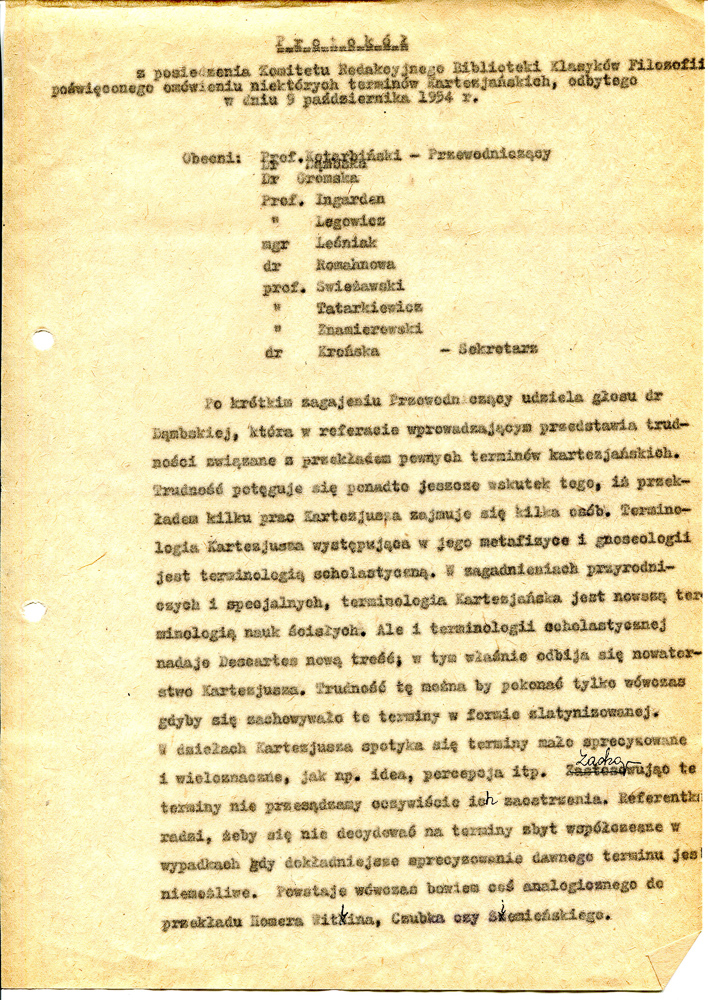
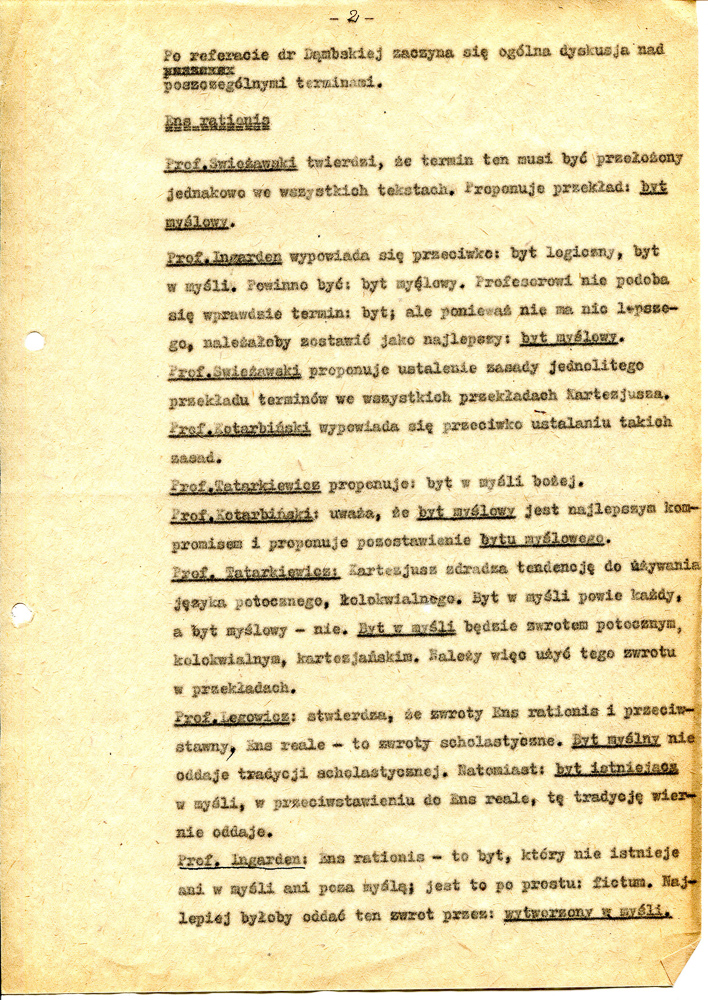

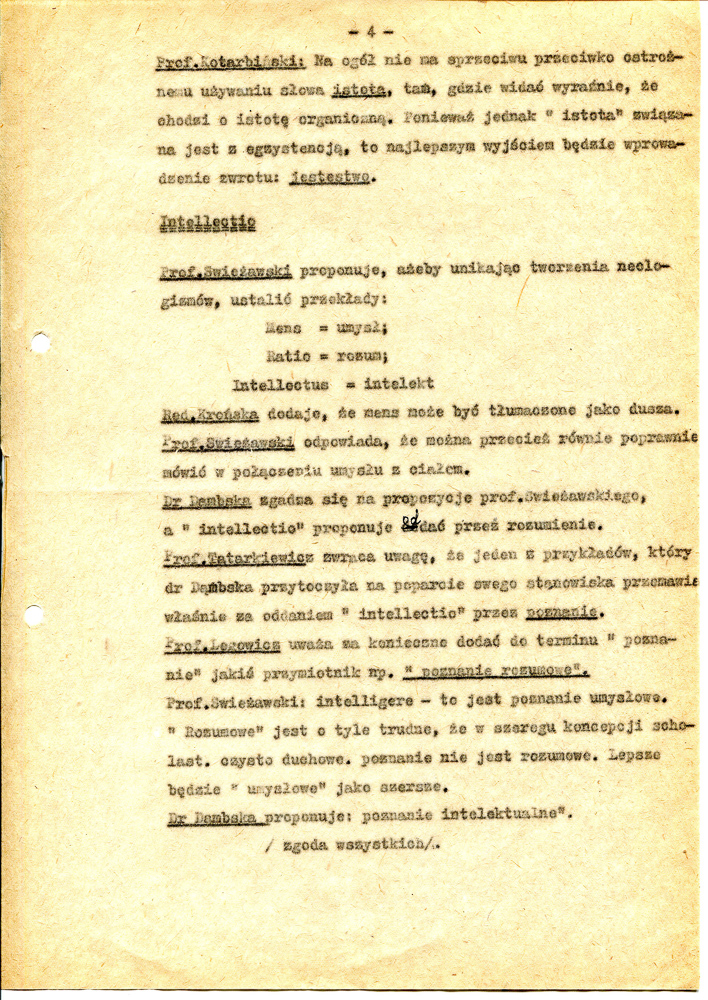
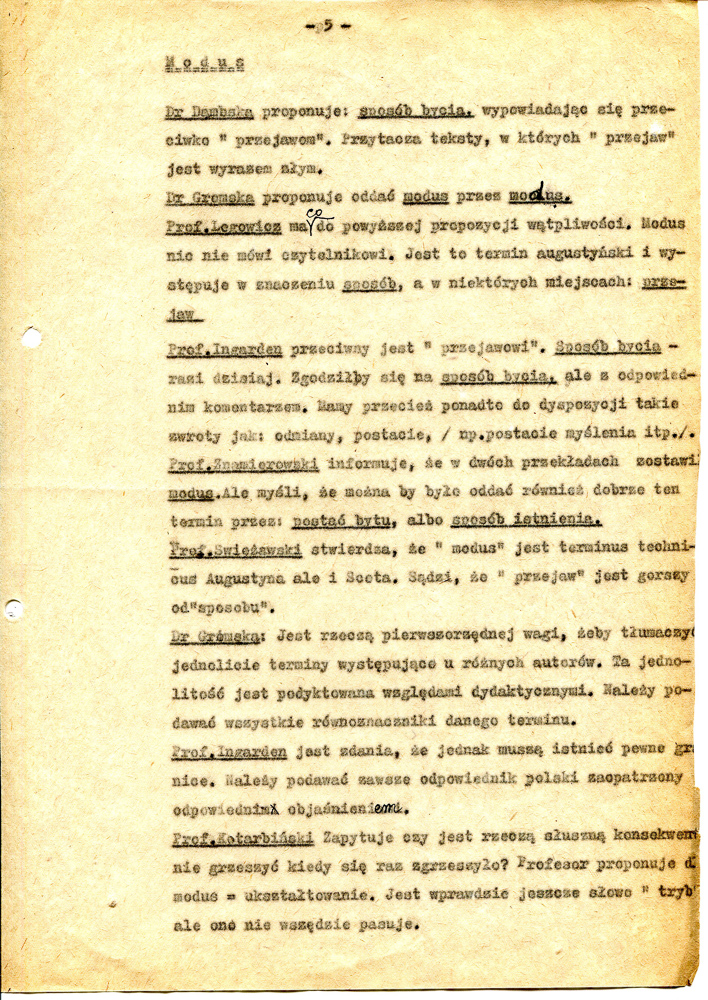
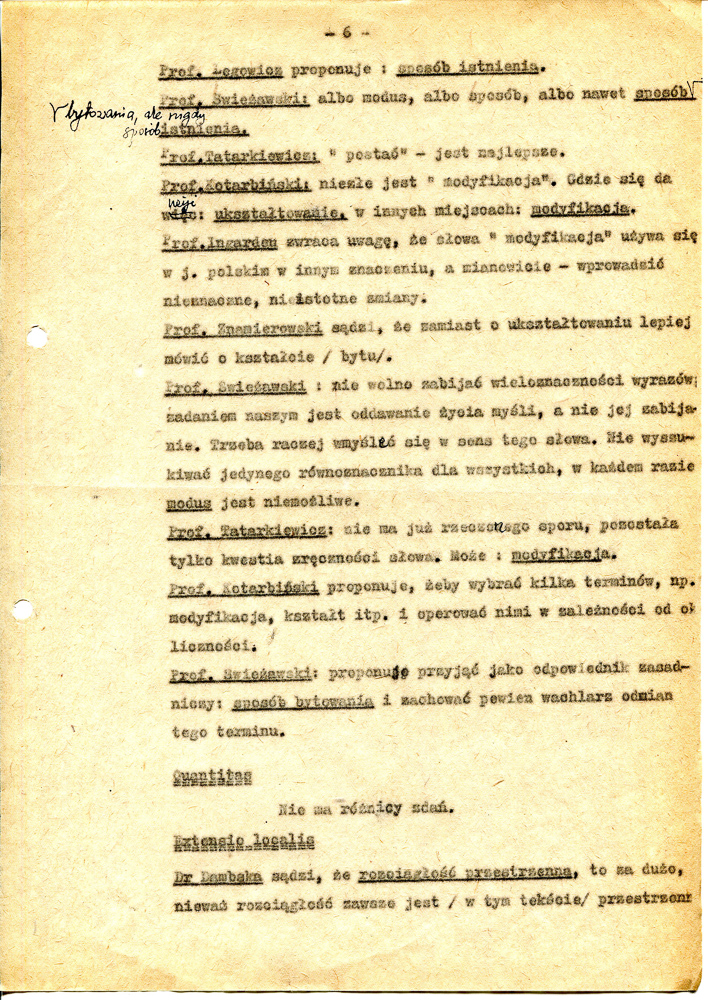


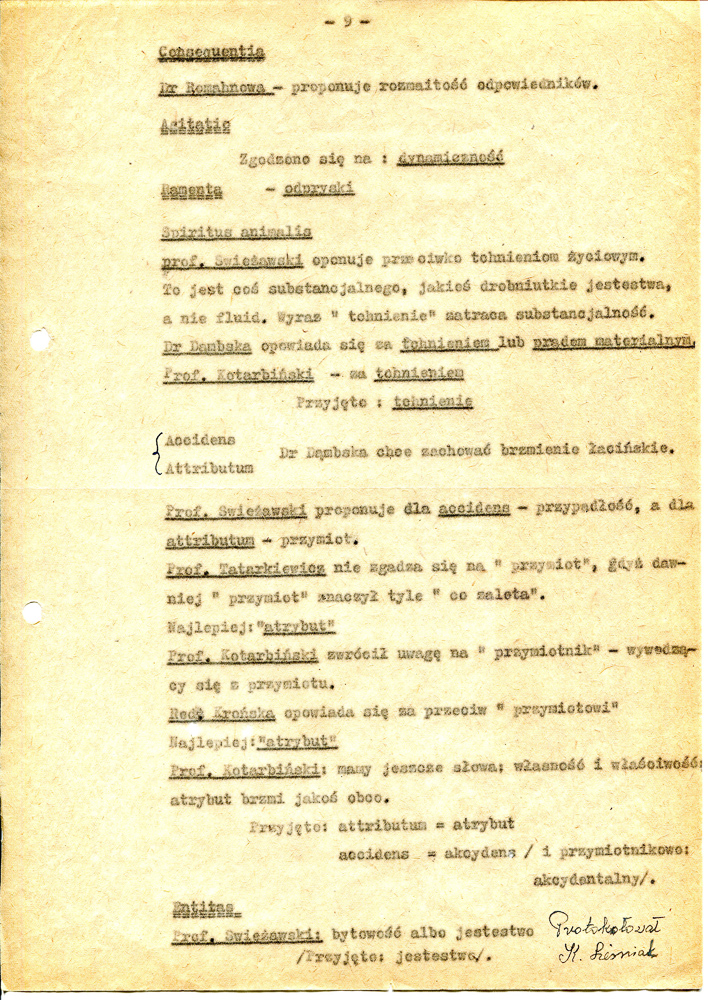
Minutes of the meeting of the Committee of the Library of Classics of Philosophy written 09.10.1964
Minutes of the meeting
of the Editorial Committee of the Library of Classics of Philosophy
dedicated to discussing some Cartesian terms
held on October 9, 1954.
Present: Prof. Kotarbiński – Chairman
v Dąmbska, PhD
v Gromska, PhD
v Prof. Ingarden
v “Legowicz
v Leśniak, M.A.
v Romanowa, PhD
v Prof. Świeżawski
v “Tatarkiewicz
v “Znamierowski
v Krońska, PhD – Secretary
v v After a short introduction, the Chairman gives the floor to Dąmbska, PhD, who presents in the introductory address the difficulties posed by translation of certain Cartesian terms. The difficulties are further increased by the fact that Descartes’ works are translated by a few different individuals. Descartes’s terminology in his metaphysics and gnoseology is of scholastic nature. In natural sciences and special issues, Cartesian terminology is a more recent terminology of exact sciences. But Descartes also provides scholastic terminology with some new content; this is where Descartes’s innovativeness lies. These difficulties could only be overcome if these terms were to be preserved in a Latinized form. In Descartes’ works one encounters many terms that are very unspecific and ambiguous, such as ideas, perceptions, etc. By retaining these terms, of course, we do not exclude the possibility of their further specification. The speaker advises not to decide on terms that are too modern in cases where it is impossible to make the old term more precise. Otherwise it could generate something similar to the Homer’s translations by Witlin, Czubek or Siemieński.
After Ms. Dąmbska’s address, a general discussion on individual terms commences.
Ens rationis
Prof. Świeżawski claims that this term must be translated the same way in all texts. I propose the translation as: intellectual being.
Prof. Ingarden speaks against: logical being, being in thought. Should be: intellectual being. Professor does not like the term: being, but since there is nothing better, intellectual being should be accepted as the best available choice
Prof. Świeżawski proposes to establish principles for uniform translation of terms in all Descartes’ translations.
Prof. Kotarbiński is against setting such rules.
Prof. Tatarkiewicz offers: being in God’s thought.
Prof. Kotarbiński, believing intellectual being to be the best compromise, proposes to accept intellectual being.
Prof. Tatarkiewicz: Descartes reveals a tendency to use colloquial language. Being in thought is something everyone would say, contrary to intellectual being. Being in thought would be a colloquial, vernacular, Cartesian phrase. So we should use this phrase for the translations.
Prof. Legowicz points out that the phrases Ens rationis and its opposite, Ens reale, are scholastic. Being existing in thought, contrasted with Ens reale, faithfully reflects this tradition.
Prof. Ingarden: Ens rationis is a being that does exists neither in thought nor outside of thought; it is simply: fictum. It would be best to reflect this phrase by: created in thought.
Prof. Świeżawski opposes Prof. Tatarkiewicz, claiming that many of Descartes’ phrases have a scholastic origin, but Cartesian significance, e.g. ratio = reason and cogitatio = thought, Ens rationis was taken over by Descartes as a terminus technicus and it cannot be treated colloquially.
Dąmbska, PhD, adds that in Descartes the whole world is ens rationis.
Prof. Kotarbiński: Ens rationis is the opposition of Ens reale and thus emphasizes non-existence, so it would be best to express this phrase by: being existing in thought / as prof. Legowicz has stated /. Thus, phrases left in the discussions are: intellectual being, being in thought, and rational being.
Romanowa, PhD, reads Prof. Ajukukiewicz’s suggestions that Ens be translated as entity, not being.
Prof. Świeżawski: the word “entity” cannot be used either. Ens must be translated as: being.
Prof. Legowicz: states that Ens is an unambiguous expression. However, in Polish the term entity might sometimes be used to mean object, of course when there is no threat of ambiguity, e.g. in the meaning of essentia. Professor Legowicz is in favor of greater freedom, and wherever the term “being” seems unnatural he would propose to use the term “object”.
Prof. Ingarden expresses support of the Legowicz-Ajdukiewicz’s position.
Prof. Kotarbiński recommends more caution. There is an old Polish word “existence”; thinking existence. Although archaic, it corresponds with the Cartesian term.
Prof. Świeżawski points out that in Objectiones et Responsies there is a discussion on the topic: easentia – existentia and therefore “entity” cannot be accepted.
Prof. Kotarbiński: There is generally no objection to the careful use of the word entity, where it can be clearly seen that it refers to organic matter. However, since “entity” is associated with existence, the best solution is to introduce the phrase: existence.
Intellectio
Prof. Świeżawski suggests to establish the following translations to avoid creation of neologisms:
v v Mens = mind;
v v Ratio = reason;
v Intellectus = Intellect
Ed. Krońska adds that the mens can be translated as soul.
Prof. Świeżawski replies that one can equally well speak of a mind-body connection.
Dąmbska, PhD agrees to Prof. Świeżawski’s suggestions, and proposes to translate “intellectio” as understanding.
Prof. Tatarkiewicz points out that one of the examples Ms. Dąmbska cited in support of her position speaks in favor of rendering “intellectio” as cognition.
Prof. Legowicz considers it necessary to add an adjective to the term “cognition”, e.g. “reason cognition”.
Prof. Świeżawski: intelligere – this is intellectual cognition. “Reason” would be difficult, as in a number of scholastic concepts purely spiritual cognition is not rational. Better to use “intellectual” as the broader term.
Dąmbska, PhD suggests: “intellectual cognition”.
/ all in favor /.
Modus
Dąmbska, PhD, suggests: way of being, simultaneously speaking against “manifestations”. He cites texts where “manifestation” is a bad expression.
Gromska, PhD suggests to translate modus as modus.
Prof. Legowicz has doubts. Modus means nothing to the reader. This is an Augustinian term and usually appears in the sense of manner, and in some places: manifestation
Prof. Ingarden speaks against “manifestation”. Way of being – strikes as awkward today. He would agree on way of being, but with proper commentary. We could also choose: varieties, forms, / e.g. forms of thought, etc. /.
Prof. Znamierowski informs that he left the term modus in two translations. But he believes that this term could also be rendered as: the form of being or the way of existence.
Prof. Świeżawski states that “modus” is a terminus technicus in Augustine, but also in Scott. He believes “manifestation” would be worse than “way.”
Gromska, PhD: It is of paramount importance to translate the terms found in works of various authors uniformly. This uniformity is dictated by didactic considerations. One has to provide all equivalents to a given term.
Prof. Ingarden is of the opinion that there must be some limits. One should always provide the Polish equivalent with an appropriate explanation.
Prof. Kotarbinski Asks whether it is right to consistently sin having sinned once? He suggests modus = formation. There is the word “mode” but it does not fit everywhere.
Prof. Legowicz suggests: way of existence.
Prof. Swieżawski: it should be either modus or way or even way of existence.
Prof. Tatarkiewicz: “form” – would be best.
Prof. Kotarbiński: “modification” seems good. Where you can use it: formation, in other cases: modification.
Prof. Ingarden points out that the word “modification” is used in Polish in a different sense, namely – to introduce slight, insignificant changes.
Prof. Znamierowski thinks that instead of formation, it is better to talk about shape / of a being /.
Prof. Świeżawski: you cannot completely get rid of the ambiguity of words, our task is to render the life of thought, not to kill it. We should rather think ourselves into the meaning of the word. We should not look for a single equivalent for everything, in any case, modus would be wrong.
Prof. Tatarkiewicz: there is no substantive dispute here, only the question of how fitting the word would be remains. Hence, maybe: modification.
Prof. Kotarbiński suggests choosing several terms, e.g. modification, shape, etc., and using them depending on the circumstances.
Prof. Świeżawski: proposes to adopt: way of living as the basic equivalent and keep a range of variations of this term.
Quantitas
No disagreements have arisen.
Extensio localis
Dąmbska, PhD, thinks that spatial extension would be going too far, because extention / in this text / is always spatial
Prof. Świeżawski: extension relating to place.
Prof. Kotarbiński: what does the adjective / localis / add?
Dąmbska, PhD
Professor Swieżawski It is about placement
Prof. Ingarden: Among the features attributed to the body, some are primary features, others are secondary. Such a primary feature is being-in-place.
Prof. Swieżawski: it is an extension that can occur in a certain place.
Animal = living entity, creature.
Prof. Świeżawski does not agree with entity. He cites “The Tree of Porphyry”.
Prof. Ingarden suggests: animal with the explanation that it also refers to all people.
Conclusion: leave animal, with an appropriate note.
Significare
Dąmbska, PhD, suggests: to mean and to reserve “to signify” for significare.
Prof. Znamierowski points out that the term “significare” cannot be rendered using just one Polish equivalent, the ambiguity that appears in Descartes should be preserved.
Prof. Ingarden advocates to mean, as Descartes does not differentiate between “to mean” and “to signify”.
Prof. Znamierowski’s suggestion is accepted: “no name can have more meaning than what it refers to.”
Species
Dąmbska, PhD translates as: cognitive form
Prof. Znamierowski: the idea of the species
Prof. Tatarkiewicz expresses belief that form would be the most fitting.
Prof. Kotarbiński emphasizes that it does not refer to innate ideas.
Prof. Świeżawski defends cognitive form.
Species is a scholastic, technical term. One cannot accept: image, shape or idea.
Prof. Tatarkiewicz states that one word must be found, a word that could be used to convey two meanings. Any other expression would be a modernization. Species sensibilis and species intelligibilis must be included in the term.
Prof. Swieżawski agrees with the above.
Prof. Znamierowski adds that if we insert “cognitive form” into the text, it will turn out wrong.
Prof. Kotarbiński: there is still aspect, but aspect also means: point of view, and then there is: equivalent or image / of course with appropriate commentary /.
Prof. Tatarkiewicz is opposed to “image”
Prof. Kotarbiński: Despite justifications to the contrary: cognitive form would not be good.
/ the case remains unresolved /.
Perceptio
Dąmbska, PhD, suggests: comprehension.
Prof. Znamierowski: perception
Ed. Krońska speaks for cognition
Prof. Ingarden: grasp or comprehend. It is a flexible word, but it is not synonymous with cognition.
Prof. Świeżawski: If we translate intentio in an epistemological sense through comprehension, then perceptio should be translated differently.
/ Agreed on: comprehension /.
Consequentia
Romanowa, PhD – suggests to use a variety of equivalents.
Agitatio
Agreed on: dynamism.
Ramenta – chippings
Spiritus animalia
Prof. Świeżawski is opposed to using life breath. This is something substantial, some tiny beings, not fluid. The word “breath” loses the substantialness.
Dąmbska, PhD, is in favor of breath or material current.
Prof. Kotarbiński – for breath
Agreed on: breath
Accidens
Attributum Dąmbska, PhD would like to preserve the Latin wording.
Prof. Świeżawski suggests affliction for accidens, and for attributum – merit.
Prof. Tatarkiewicz does not agree to “attribute”, because in the past “merit” only meant “virtue.”
Best: “attribute”
Prof. Kotarbiński points to the word “adjective” – derived from “merit” [Polish: przymiot – merit, przymiotnik – adjective – transl. note].
Ed. Krońska is in favor of “attribute”
Best: “attribute”
Prof. Kotarbiński: we still have the words: property and quality, the attribute sounds somewhat foreign.
v Agreed on: attributum = attribute
v v v accidens = accident / adjective: accidental /.
Entitas
Prof. Swieżawski: beingness or existence
v v / Agreed on: existence/.
the minutes were taken by
v K. Leśniak
